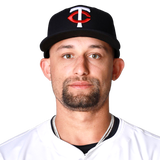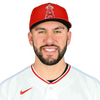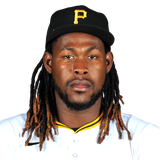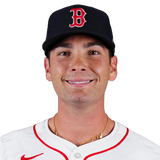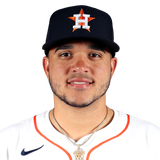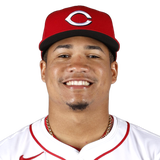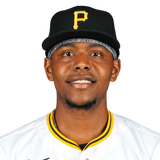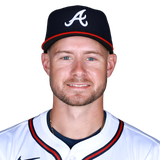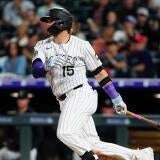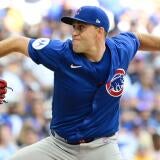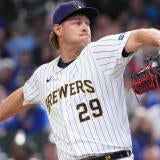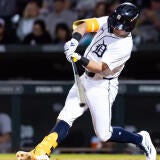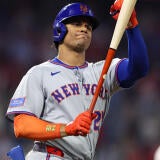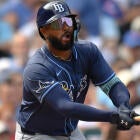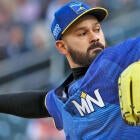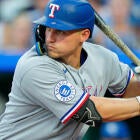| ||||||||||||
2024 Fantasy Baseball Draft Prep: Breakouts 1.0 for Scott White features league-winning players to target
These players figure to up their game in 2024
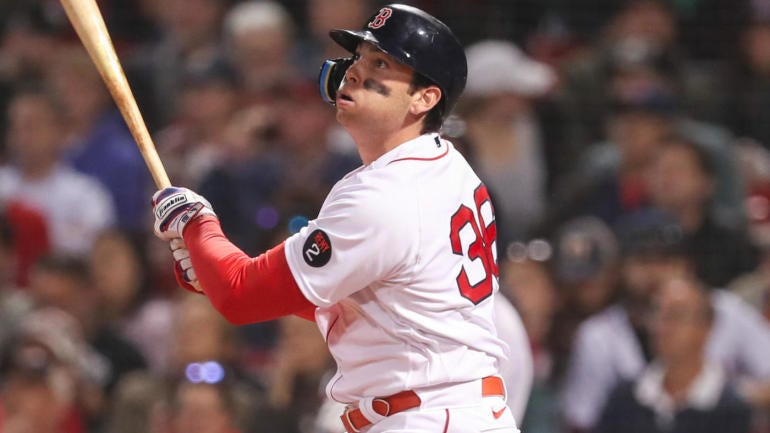
The line between a sleeper and a breakout can be a thin one. Both categories feature players I "like," in a broad sense. But while the emphasis for sleepers is cost, meaning there has to be an element of value, the emphasis for breakouts is growth. A breakout may already be good, universally beloved and as costly as he needs to be, but the key is that he's about to do something he's never done before.
So on the whole, I'd say that my breakouts are higher-end than my sleepers. They're generally higher-upside and more exciting to draft. But since the value isn't necessarily there for them, I'm unlikely to come out of a draft with as many.
- Sleepers 1.0: Scott | Chris | Frank
- Breakouts 1.0: Scott | Chris | Frank
- Busts 1.0: Scott | Chris | Frank
Still, it's helpful to know which players are likely to make a leap this year so that you don't fixate on their past numbers. And it may be that those past numbers do make them a value in drafts -- nobody said a breakout couldn't also be a sleeper, especially those further down this list -- in which case you'll know to capitalize.
Royce Lewis, 3B, Twins
NFBC ADP: 48.2
It's been a long time coming for the No. 1 pick in the 2017 draft. Some mechanical glitches diminished Lewis' stock and left him with no chance of redeeming it for two years, first because of the pandemic and then because of a torn ACL. And then when he finally reached the majors and started to get comfortable early in 2022, he tore his ACL again. With so few reps over such a long period of time, it's reasonable to wonder how much we can trust in what we've seen from him so far, and to that, I say ...
Look ... between the majors and minors the past two years, even with the interruption of a second ACL tear, Lewis has a .310 batting average, 32 home runs, 23 stolen bases and .959 OPS. That's in just 461 at-bats, which is a pretty good sample but not quite a season's worth. A particularly hot or cold stretch could be enough to skew the numbers still. But here's where I point out that he made five total stops over that two-year period, one at Double-A, two at Triple-A and two in the majors. His lowest batting average at any of those five stops was .300. His lowest OPS was .867.
If you prefer more advanced metrics, you'll find consistency there, too. Lewi's max exit velocity in both 2022 and 2023 -- with a torn ACL in between, remember -- was exactly 114 mph, putting him the top 10 percent of the league. His average exit velocity was between 90 and 91 mph both years, putting him in the same range as Bobby Witt and Bo Bichette. His actual stats exceed his expected stats, yes, but only to the normal degree for a player who excels at elevating the ball to his pull side. And then there's the fact he homered 15 times in his final 32 games, including the playoffs, overcoming his past hardships with a two-month run for the ages.
Add it all up, from where he was drafted to what we last saw him do, and everything points to Lewis being a special player. The only reason you might hesitate to invest one of your first five picks in him is for fear of him getting hurt again.
Tarik Skubal, SP, Tigers
| ||||||||||||
NFBC ADP: 54.6
A former top prospect with some awe-inspiring minor-league stat lines, Skubal was beginning to emerge as a useful Fantasy starter in 2022 when he needed surgery to repair the flexor tendon in his elbow. The recovery kept him out of sight, out of mind for nearly a full calendar year, but then he returned last July with an additional 1.5 mph on his fastball. It meant he didn't have to rely so much on a so-so slider, and it made his already excellent changeup a true nightmare of a pitch, yielding better than a 50 percent whiff rate.
If you think his resulting 2.80 ERA was impressive, check out his 2.28 xERA and his 2.00 FIP. The former led all pitchers (minimum 80 innings) by 72 points and the latter by 83 points. In other words, by all of our most advanced methods of evaluating pitchers, Skubal was far and away the best -- better than Spencer Strider, better than Tyler Gasnow.
If you break him down on a more granular level, you'll come away just as impressed. His control is exceptional for someone who misses so many at-bats, giving him a 7-to-1 strikeout-to-walk ratio that would have ranked third among qualifiers, and on the rare occasion hitters do make contact, it's usually on the ground, giving him a 51.6 percent ground-ball rate that would have ranked fourth among qualifiers. Of course, stellar ratios are easily undermined by a wimpy workload, but Skubal made it six-plus innings in six of his final eight starts, including seven in three of them.
Other than a lack of longevity, I can't find anything bad to say about Skubal. You could make the case that his breakout already happened, and judging by his Round 5 price tag in a 12-team league, it's true no one is sleeping on him. But I don't think he'll just be a good pitcher in 2023. I think he could be the very best and will go so far as to call him my early pick for AL Cy Young.
The four standout sophomore hurlers
NFBC ADP (respectively): 71.3, 75.9, 83.0, 115.1
I'm going lump these four together because they all come with a top prospect pedigree, showed tremendous upside as rookies and are being drafted in the same general range (with the possible exception of Bibee, who is more likely undervalued than the other three are overvalued). How can I possibly choose between them?
OK, so if you're forcing me to play favorites, I'd rank them Eury Perez, Grayson Rodriguez, Bobby Miller and Tanner Bibee, and I'll get into the reason why. But the honest truth is I think all four will emerge as aces or something close to it, and my true preference would be to diversify my investment across multiple leagues in case one fails to deliver on those expectations. I wouldn't dare guess which one it would be.
Perez's upside is probably the greatest of the bunch, but only because his upside might be the greatest among starting pitches period. Having just one pitch with a 40 percent whiff rate is a mark of greatness. He had three as a rookie last year, including a curveball at 54.3 percent. The distribution of those pitches could stand to be more even -- like many young hurlers, Perez is a little too fond of his fastball -- but even so, his 15.7 percent swinging-strike rate as a rookie would have ranked second among qualifiers, behind only Spencer Strider.
Rodriguez's swinging-strike rate was tamer at 12.1 percent, but it improved to 13 percent after his month-long stint in the minors, which would have ranked ninth among qualifiers. That time in the minors was spent shoring up the command of his fastball and the shape of his slider, and seeing as he had a 7.35 ERA before and a 2.58 ERA after, it had the desired effect.
Miller ended the season on a similar high note, putting together a 3.19 ERA, 0.90 WHIP and 9.8 K/9 in his final six starts, three of which went seven innings. His swinging-strike rate for the year was a modest 11.3 percent, but it climbed to 13.5 percent during that final month as he began to lean on his changeup more. He has an unusually diverse arsenal for someone so young, featuring five pitches that he throws more than 15 percent of the time. The biggest concern for him is that the Dodgers are flirting with the idea of a six-man rotation this year.
Finally, there's Bibee, who had the best rookie season of the three but is going 30-40 picks later than all of them. The only reason I can figure is that he doesn't throw quite as hard, but he still throws plenty hard and has two pitches (slider and changeup) capable of producing whiffs. Like the others, he ended the year on his highest note, delivering a 2.40 ERA over the final three months, but what's most impressive about his rookie performance is that he did it without making use of his best asset. Superlative control was his calling card as a prospect, but he issued nearly three walks per nine as a rookie. It's reasonable to assume that number improves in Year 2.
Oneil Cruz, SS, Pirates
| ||||||||||||
NFBC ADP: 80.6
We'll never know what would have happened if Cruz hadn't fractured his ankle last April -- an injury that turned out to be season-ending -- but nine games into it, the breakout that so many predicted for him appeared to be well on its way. He had already stolen three bases and hit a 425-foot home run, but more than that, he had struck out just eight times in 40 plate appearances for a rate of 20 percent. That followed a spring training in which he struck out 25 percent of the time, and both numbers represented a vast improvement over his 35 percent strikeout rate as a rookie.
So much has happened since then that it's easy to lose sight of the enthusiasm for Cruz at that point. He was Elly De La Cruz before Elly De La Cruz, consistently wowing us with his athletic feats and even setting a record for hardest-hit ball in the Statcast era. By all the ways we can measure upside, Cruz appeared to have as much as just about anybody, but to get to it all, he'd have to stop striking out so much. And for the little bit we saw him in 2023, he did -- and by more than we would have hoped, even. Just getting that strikeout rate below 30 percent in September 2022 led to him hitting .288 with six homers, four steals and an .884 OPS for the month.
His current ADP is almost identical to a year ago, treating 2023 as if it never happened -- which it hardly did in his case. You might worry about lingering effects from the ankle injury, but for me, those small signs of improvement count for more. Comparing the cost of Cruz to De La Cruz, who had his own struggles with strikeouts (as well as launch angle) as a rookie, it's no contest who I'd rather have.
Triston Casas, 1B, Red Sox
| ||||||||||||
NFBC ADP: 106.0
My enthusiasm for Casas is summed up rather easily. In the second half last year, he slashed .317/.417/.617, hitting 15 of his 24 home runs. Those numbers are not only spectacular but also in line with the lofty comparisons to Freddie Freeman and Joey Votto as he ascended the minor-league ladder. Is he really going to be as good as those two eventual Hall of Famers? The smart money says no, but I will point out the similarities between his batted-ball profile and Freeman's. Both are up-the-middle-focused, their hits well distributed between center, left and right field, and generally don't put the ball on the ground. Both have an average exit velocity of about 91 mph and a max of about 113. Casas strikes out a little more than Freeman did at the start of his career, but only a little more, and it trended down in the second half.
That he performed like Freeman in the second half should at least open your mind to the possibility he's in the mold of such a player, and of course, a knack for driving the ball to the opposite field should work out well for a left-hander at Fenway Park, scoring him cheap hits off the Green Monster and cheap home runs over it. There is the matter of him sitting against lefties, which I think is why he remains relatively affordable in drafts, but that also began to change in the second half. Counting only the time he was healthy enough to play, he sat against just one of the last 10 lefties the Red Sox faced. The fact is he's the Red Sox's best homegrown hitter since Rafael Devers and will have similar prominence in the lineup soon enough. My bet is this year, so if you miss out on the elite first basemen, Casas should be a prime target for you.
Yainer Diaz, C, Astros
| ||||||||||||
NFBC ADP: 108.7
This one isn't particularly hard either. Diaz was an absolute monster of a hitter last year, despite being a rookie and despite having to settle for backup duties behind the plate. His .282 batting averaged ranked third among catchers with at least .300 at-bats. So did his 23 home runs. And as for his .846 OPS, well, that ranked No. 1. Normally when you see such outlier stats, particularly from a rookie and a part-timer, you can expect that good luck played a part, but Diaz actually underperformed his .288 xBA and his .543 xSLG, which both ranked in the top 10 percent of the league.
My initial inclination heading into the offseason was to rank Diaz as a top-five catcher for 2024 even with the uncertainty surrounding his playing time. I worried the Astros might bring back Martin Maldonado or some other defensive-minded alternative, leaving Diaz to scrape together at-bats between catcher, DH and first base, as happened in 2023, and I presumed the cloud of uncertainty would linger all the way to opening day, requiring a certain faith to draft Diaz so high. I never imagined GM Dana Brown would do us the solid of naming Diaz the Astros' starting catcher in November.
This should be the easiest of calls now. Maybe if this performance had come out of nowhere, some caution would be warranted, but Diaz hit .306 with 25 homers and an .898 OPS in his final minor-league season as well. The only hesitation would be if you play in a points league or some other format that rewards walks, because there's absolutely no patience to his approach, his 2.9 percent walk rate ranking in the bottom 1 percent of the league. But even in such formats, given how few catchers are game-changers in Fantasy, you can only hold out so long.
Seiya Suzuki, OF, Cubs
| ||||||||||||
NFBC ADP: 111.3
Suzuki was probably the highest-profile hitter to come out of Japan since Shohei Ohtani himself, so while he showed flashes as a rookie in 2022, the final results were underwhelming. Last year brought more of the same, at least to start out. The 29-year-old entered August batting just .249 with eight homers and a .713 OPS, all hopes for Fantasy greatness relegated to a distant memory.
But that's when everything clicked for him finally. Over the final two months, he hit .350 (65 for 186) with 12 homers and a 1.073 OPS, striking out just 17.4 percent of the time compared to 25 percent before then. I wouldn't claim to know exactly what changed, but I will point that Suzuki's struggles in his first year and a half with the Cubs were just as mysterious. The underlying metrics were always strong, his Statcast page lit up in red with most every quality-of-contact stat being 60th percentile or higher.
"It was more on the mental aspect," Suzuki said of the change, with then-manager David Ross telling The Athletic that the biggest change he saw in Suzuki was a renewed sense of fun.
I'm left to speculate, then, that his turnaround was largely a matter of him becoming more comfortable with his surroundings. It's a difficult thing, leaving your home country and moving half a world away, where there's a different culture, different language, and that's even before you get to the baseball side. That he'd need a year and a half to reclaim the headspace to play his best isn't at all far-fetched, especially since we've seen it happen to other players making that same move. And if Suzuki's strong finish was the start of something rather than a correction, he could be the impact hitter we're aching for after the top 25 are gone in the outfield.
Noelvi Marte, 3B, Reds
| ||||||||||||
NFBC ADP: 161.1
Marte was hyped up so much as a 17-year-old international signing for the Mariners, with comparisons like Hanley Ramirez being bandied about, that his yeoman's work in the minors was treated almost with contempt. By the time he arrived in the majors as a 21-year-old last August, the prevailing assumption was that he wasn't such a big deal. Suffice it to say he made a believer of me in the six weeks that followed.
What stood out most was how hard he hit the ball. His 91.3 mph average exit velocity was actually higher than that of his more celebrated teammate, Elly De La Cruz, and his 115.6 mph max exit velocity (which, again, he achieved in the span of just six weeks) put him in the top 5 percent of the league. Of course, the impact on the ball is only as good as the angle, and you may point to Marte's 52.8 percent ground-ball rate as cause for concern there. But he cut it to 44.2 percent over the final three of his six weeks, which is more in line with his minor-league numbers.
Meanwhile, his speed measured in the 91st percentile, and he made ample use of it during that short stint, swiping six bases in eight tries. His 20.3 percent strikeout rate certainly doesn't present a problem, as was true throughout his minor-league career as well. For all of the Reds' infield excess, there's been little speculation that Marte would be among those to split time, and I think it's obvious why. By pure ability, he's their second-best player after De La Cruz, who lags behind Marte in terms of polish. With a swing geared for damage in a park that multiplies it and an inclination to run in a league that encourages it, Marte is indeed shaping up to be a big deal. Maybe those Hanley Ramirez comparisons weren't so far-fetched after all.
Mitch Keller, SP, Pirates
| ||||||||||||
NFBC ADP: 166.7
Hot take: Keller's breakout already happened. It's hard to believe looking at the final stats, but he was one of the aces of the first half, taking a 9-4 record, 3.31 ERA, 1.12 WHIP and 9.9 K/9 with him into the All-Star break. The 5.59 ERA that came after was enough to convince everyone it was a mirage.
But was it really? I look at the game log from Keller's second half and see two outings with eight scoreless innings. I see another outing with 12 strikeouts and two more with eight strikeouts. I see the kind of outings that defined his first half -- ones only aces can deliver with any sort of regularity -- and I wonder. I also see four outings in which he allowed seven earned runs or more, and if you remove those from the equation, he has a 3.13 ERA, 1.14 WHIP and 10.1 K/9 for the year. That's right: his ERA drops by more than a full run.
It's funny how four starts out of 32 can do that much damage. You might wonder why it matters how the damage was distributed when the damage nonetheless occurred, and on a pure statistical level, it doesn't. But it does shed some light on that 4.21 ERA. It's not that Keller was struggling to keep his head above water start after start. Most were flat-out dominant, his new cutter having transformed him into a genuine strikeout pitcher. But then there were just a handful where he got his face caved in. The phenomenon wasn't unique to him in 2023, when a series of rule changes put more men on base, made them more aggressive when they got there and required pitchers to keep up the tempo anyway. Bad starts tended to spiral out of control even for the best pitchers.
In many ways, Keller's 2023 was a lot like Aaron Nola's, a few disastrous starts mixing with the brilliant ones for an unsavory ERA. What it means is if that he can learn to navigate those situations better and prevent a bad situation from becoming worse, the tools are in place for an ace outcome.
Ke'Bryan Hayes, 3B, Pirates
| ||||||||||||
NFBC ADP: 171.9
Ever since Hayes burst onto the scene with five home runs in 24 games during the pandemic-shortened 2020 season, we've been waiting for him to bring the power back. The exit velocities have always been there, with both max and average ranking in the upper third of the league every year, but the angle the ball took off the bat just wasn't optimized for power.
That all changed the final two months of 2023. Hayes put the ball in the air 41.5 percent of the time and pulled it 35.4 percent of the time. His career highs in those areas coming into the year were 30.8 percent and 27 percent, respectively. The result was that 10 of his career-high 15 home runs came during that two-month period, during which he slashed .299/.335/.539.
"I felt really good," Hayes told the Pittsburgh Tribune-Review, which also noted that he added a toe tap to his swing. "I felt more free at the plate, more aggressive. I feel like I was able to go up there, be an athlete and just hit."
Meanwhile, his average exit velocity during those two months was 92.3 mph, which is exactly what Austin Riley averaged for the season. Hayes has never had strikeout issues and has always been somewhat helpful in stolen bases. If he can continue to lift the ball like he did in the final two months, everything else points to him being a Fantasy standout. A .280 batting average with 25 homers and 15 steals is within the realm of possibility.
Ryan Pepiot, RP, Rays
| ||||||||||||
NFBC ADP: 202.8
It's rare that you see a player's biggest weakness become his biggest strength, but that's exactly what happened for Pepiot last year. He went from walking 4.4 batters per nine innings between the majors and minors in 2022 to walking 1.4 per nine between the majors and minors in 2023. Of course, he threw only 62 2/3 innings, being limited at the start of the year by an oblique injury. Is that a large enough sample to dismiss a flaw that's been with him from the start of his minor-league career?
The Rays must have thought so, making Pepiot the centerpiece of their return for Tyler Glasnow this offseason. And really, there can be no greater testament to a pitcher's potential than finding out the Rays believe in him. Time and time again, they've acquired one of little renown and immediately gone to work remaking his arsenal to maximum effect. They gave Zach Eflin the biggest free agent contract in their history last offseason, to the snickers of many, and he went on to finish sixth in AL Cy Young voting.
You don't have to look so hard to see what Pepiot has to work with, beyond his newfound control. He averaged 11.2 K/9 over his minor-league career, and while his 8.1 K/9 in the majors last year was low by comparison, perhaps even calling into question his 2.14 ERA, it came with a swinging-strike rate (12.2 percent) identical to Corbin Burnes'. Pepiot's fastball, changeup and slider all generate whiffs at an above-average rate, giving him the makings of a strikeout pitcher. And knowing the Rays, it's likely his best pitch has yet to be revealed, even.
Jarred Kelenic, OF, Braves
| ||||||||||||
NFBC ADP: 224.6
Again with this guy? If the Mariners have moved on by now, why shouldn't we? Well, look at the team that acquired him. Rarely have the Braves made a wrong move under GM Alex Anthopoulos, whose maneuvering would suggest he prefers Kelenic to both Eddie Rosario, whose $9 million option he declined, and Vaughn Grissom, who he made the centerpiece of the Chris Sale trade (see Sleepers 1.0 for more on that).
And the truth is Kelenic made legitimate progress last season. A .253 batting average is cause for celebration after hitting a combined .168 the previous two years. But more than that, he became playable against left-handers, batting .259 with a .774 OPS against them compared to .251 and .738 against righties. And more than that, he proved he could actually hit a slider, batting .233 with five home runs against it compared to .129 with one home run the previous two years. He doesn't need to be a Goliath against sliders. Few hitters are. He just needs to demonstrate competence against them to have any hope of seeing hittable fastballs.
The progress is clear, and it's progress enough for a 24-year-old. We enjoyed roughly a decade (the 2010s, basically) of big-name prospect arriving as fully formed players, delivering peak production right away, but that's not the norm historically. More recent years have reintroduced us to the struggle, with Kelenic being Exhibit A, but the strides he made last year have positioned him for bigger things. He's still in the top 25 percent for how hard he hits the ball. He's still in the top 33 percent for how fast he runs. And while he strikes out too much to compete with Michael Harris in batting average, it wouldn't be surprising if he's the more productive outfielder overall, especially since the Braves seem to have positioned him for everyday at-bats.


